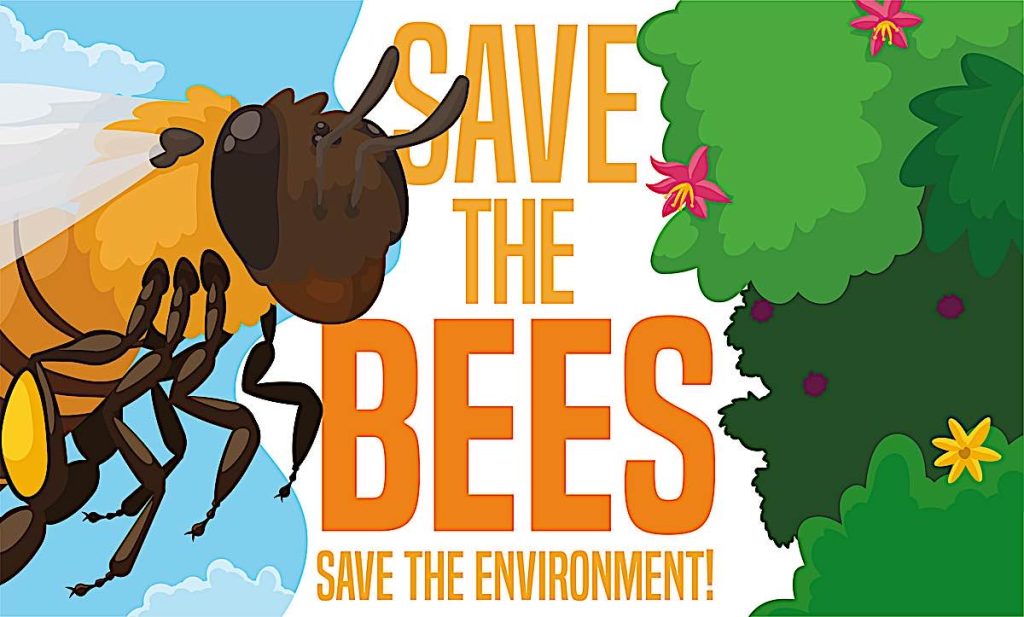From a “bee’s point of view” conservation of the earth is clearly Buddha Dharma practice. Saving bees — and our earth — is a practice of the Paramita of Metta, or loving-kindness. The discipline needed, to accomplish conservation in our personal lives, is a positive karmic act of Sila, or moral conduct. Giving of your time, to socially campaign for the bees and the environment are acts of Dana, or giving. From a bee’s point of view, saving the bees involves practicing three of the ten perfections: Metta, Sila and Dana. Perhaps even a little Viraya, or “energetic” activity. Certainly, Adhitthana, or determination. Already five of the Paramitas, or perfections, six if you add Wisdom.
By Karoline Gore
The living Earth is, by its nature, interdependent. The Dalai Lama highlighted this in one profile of the teachings of Nagarjuna, which taught the emptiness, or shunyata, of life — specifically, that things exist by their dependence on one another. The Dalai Lama specifically described the human role in this inter-dependency with our environment:
“So when you say environment or preservation of environment, it is related with many things. Ultimately the decision must come from the human heart, isn’t that right? So I think the key point is genuine sense of universal responsibility which is based on love, compassion and clear awareness.”
Save the Bees. Save the Environment. Getting involved in the Conservation of our interdependent world, is an important Buddha Dharma practice.
Humans have unfortunately forgotten this lesson, and act as independent; according to the Intergovernmental Science-Policy Platform on Biodiversity and Ecosystem Services, the planet faces an unprecedented ecological decline, with up to 1,000,000 living species at risk of extinction. Buddhism teaches of the importance of all life, and in taking actions to help aid preservation, followers can practice a pāramitā with each of their actions and step closer to perfection.
Caring for bees
All living creatures are equally valid, yet, when it comes to purely human interests, bees are crucial.
According to Greenpeace, every one in three bites of food taken is thanks to a bee.
Their cross-pollination action is essential to the growth of food and sustenance of the human race; the bumble, carpenter and sweet bees in particular. Bees can be thought of as engaging a core focus at the heart of the pāramitās, altruism. As Geshe Sonam Rinchen taught in The Six Perfections, the giving of one’s body and resources brings virtue.
A common eastern bee on a swamp milkweed flower.
Unfortunately, bees are at grave risk of being wiped out; in the USA, hives have reduced by 60% in just 60 years. Responding to this, and now providing homes and sustenance for bees through, for example, bug boxes and bee baths, is virtuous.
The Paramita of becoming disciplined in purchases
Tending to your own local habitats will bring about wonderful change for local insects and, from there, the entire natural food chain. Effecting wider change is more difficult, but can be achieved through conscious living. Avoiding all pollutants and products of exploitation is difficult in the modern consumer market, but you can make strides by purchasing items for life, rather than for convenience, and by recycling everything you can. As it happens, this is the same process that needs to be taken in order to eschew consumption and achieve paramita of wisdom. One analysis by BuddhistDoor highlights the work of Sulak Sivaraksa in reviving ‘Buddhist economics’. The most virtuous way of living is also the most environmentally positive.
Save Bees. Save Nature.
Pushing for more
Of course, long-term change can only really be created through concerted pressure. Governments and international bodies hold the keys to creating change, but they can be influenced over a lifetime.
Social and political pressure is key, but the power of meditation is important, too. The Kagyu Samye Ling Monastery highlights how both Hinayana and Mahayana meditation schools focus on clarity of thought and actual realization and how this can be a means to an end in affecting long-term change.
A lifetime dedicated to conservation is a lifestyle choice in itself. It’s not enough to simply hope for the best – actions make a difference, and time-honored teachings show that. The Dalai Lama expressed an optimistic view of human being’s role in conservation:
“Since I deeply believe that basically human beings are of a gentle nature so I think the human attitude towards our environment should be gentle. Therefore I believe that not only should we keep our relationship with our other fellow human beings very gentle and non-violent, but it is also very important to extend that kind of attitude to the natural environment. I think morally speaking we can think like that and we should all be concerned for our environment.”

